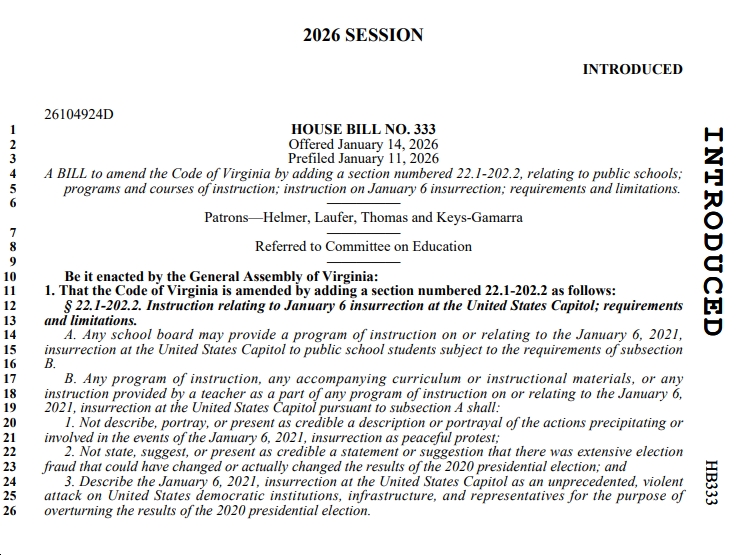by Cindy
A fiscal impact statement is a short document that accompanies a bill filed in the General Assembly. It’s meant to describe the costs or benefits to the Commonwealth that would result from passing the bill. Fiscal impact statements are prepared by the Department of Planning and Budget (DPB), an agency under the Secretary of Finance. Not all bills are required by law to have a fiscal impact assessment, although Delegate Mark Keam proposed a bill that would have required them for every bill with a budget impact.
I’ve been looking at the fiscal impact statements of various bills this session, and I’ve observed some interesting things. For the most part, the statements are very narrowly focused on direct costs to agencies of the Commonwealth, and revenues contributed to the General Fund.
Take, for example, a bill like Delegate Rip Sullivan’s HB1450, that creates a mandatory energy efficiency standard. This is an incredibly important bill that helps reduce the damage to the climate that Virginians are causing. It is likely to require utility companies to spend money developing and implementing energy efficiency programs that can range from smart thermostats that adjust to your needs and usage, energy-saving appliance rebate programs, rebates for installing electric vehicle charging stations, and more. Increased energy efficiency also means using less electricity, which changes the revenues to the utility as well as the amount Virginians will pay in utility bills. Finally, there are massive monetary and non-monetary costs to climate change, and any bill such as this that slows our carbon emissions affects those costs. But the fiscal impact statement mentions none of this. It says the impact would be “fairly minimal,” and only mentions that it’s possible the Division of Public Utility Regulation might need additional staff to review the utility’s proposals to meet this standard.
The narrow focus can lead to some pretty ridiculous-sounding fiscal impact statements. For fun, let’s look at Senator Scott Surovell’s SB449 to repeal the death penalty in Virginia. The fiscal impact statements (one from the Virginia Criminal Sentencing Commission, and the other from DPB) list the only costs or benefits to the Commonwealth of eliminating the death penalty is that the two men currently sitting on death row, who they estimate would most likely be executed in 2023 and 2024 respectively, would now instead be kept in prison, at a cost of $36,315 per year each. (Interestingly, they “estimate” that because juries have given no death sentences since 2011, that there will be no future death sentences.) This neglects all the legal costs that must be provided for anyone facing execution (capital defenders offices plus court-appointed counsel, who provide legal representation to those facing execution, plus all their costs—investigators, travel, etc.), the extra legal expenses on the prosecution side for capital murder cases, including those in the Attorney General’s office, the difference between the costs of a death row bed and the costs of a non-death row bed, the extremely high cost of obtaining the lethal injection drugs, and all the things I can’t think of. These cost savings from eliminating the death penalty run in the millions of dollars, far exceeding the $72,630 for beds.
Finally, there definitely seems to be some randomness (maybe based on which analyst happens to perform the analysis)—or politics—to how narrowly the fiscal impact is assessed. For example, in Senator Dick Saslaw’s SB7 to raise the minimum wage, the fiscal impact statement measures the additional wage costs expected per year to raise the pay of those state workers who are not currently earning what the proposed minimum wage would be (plus the decrease in ABC revenues from paying those workers the new minimum wage). It ignores any collateral effects, like decreased usage of low-income assistance programs that the state contributes to—SNAP, WIC, school lunch programs, TANF, etc. Nor does it mention any additional sales tax revenue from low-income families having more disposable income; and the fiscal impact statement also does not mention any decreased business tax revenue to the Commonwealth that might result from businesses choosing to locate elsewhere where they can find cheaper labor (although dozens of industry lobbyists lined up to say this during the hearing of the bill).
Compare this, though, to the fiscal impact statement on Delegate Lee Carter’s HB153 to repeal Virginia’s so-called “right to work” law. Here, there are no agency costs or revenues to this (makes sense, since public workers cannot currently collectively bargain in Virginia anyway), but the statement cites the Virginia Economic Development Partnership concerns that many of the “nearly 60 projects in the manufacturing and supply chain sectors that represented 8,400 jobs and $6 billion in capital investment” announced over the previous 18 months “would not have occurred if Virginia were not a ‘right to work’ state.” Then they wave their hands wildly in speculation not found in most other fiscal impact statements I looked at, and conclude that, while the fiscal impact is indeterminate, the bill “would result in the loss of new project announcements representing thousands of manufacturing and supply chain jobs, particularly in rural and small metro areas, and that the Commonwealth would lose approximately $9-25 million in state general fund revenue per year.” I won’t comment on the accuracy or inaccuracy of these estimates (although I will say that earlier in the session, I did look desperately for any modern data on states adopting or repealing “right to work” laws, and only found this recent, unpublished dissertation, which suggests some effects on raising wages, but only minimal effects on manufacturing employment), but will only say that this goes far beyond the direct, immediate costs to agencies that were measured in the other fiscal impact statements.
There’s not really an “and, so?” to this post. I have believed for a while that the legislative team should not only consist of lawyers going over proposed code changes to assess how they fit into the code and the constitutionality of the changes, but also should include greater input from economists as to the economic impacts (a broader concept than fiscal impacts) of proposed changes. This might be tough given the shortness of the legislative session, but given how incomplete and potentially misleading the fiscal impact statements are, is something that should be considered.





![Thursday News: “Europe draws red line on Greenland after a year of trying to pacify Trump”; “ICE Agent Kills Woman, DHS Tells Obvious, Insane Lies About It”; “Trump’s DOJ sued Virginia. Our attorney general surrendered”; “Political domino effect hits Alexandria as Sen. Ebbin [to resign] to join Spanberger administration”](https://bluevirginia.us/wp-content/uploads/2026/01/montage010826.jpg)












